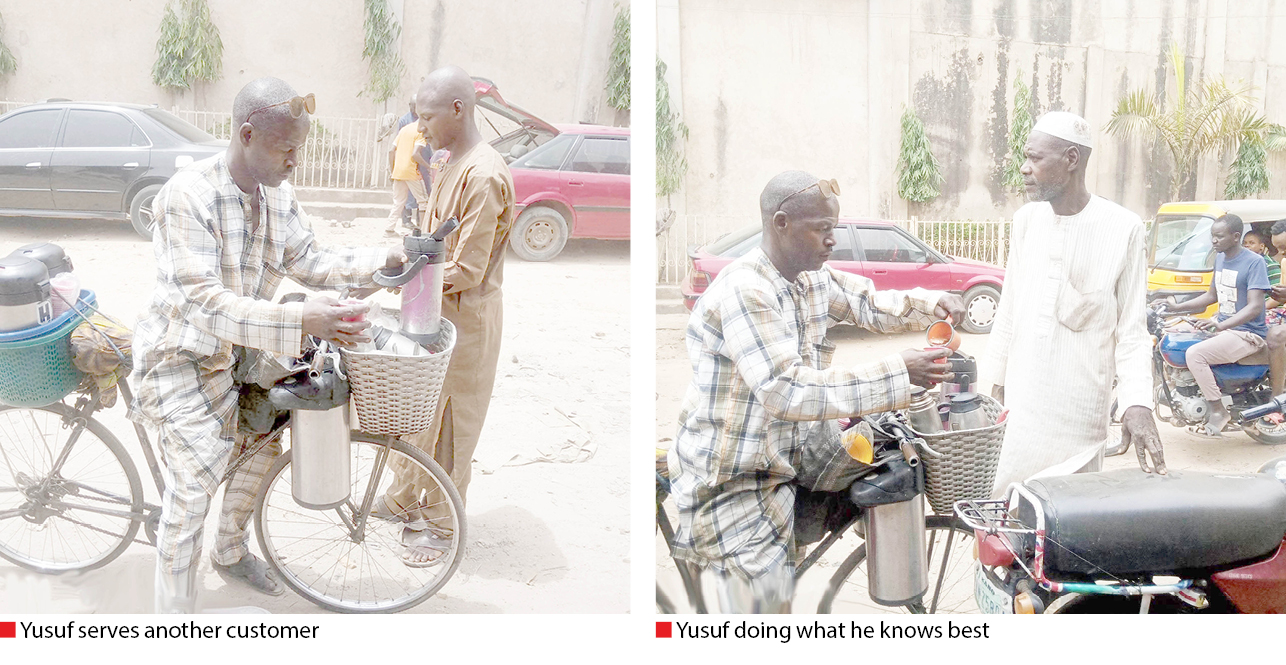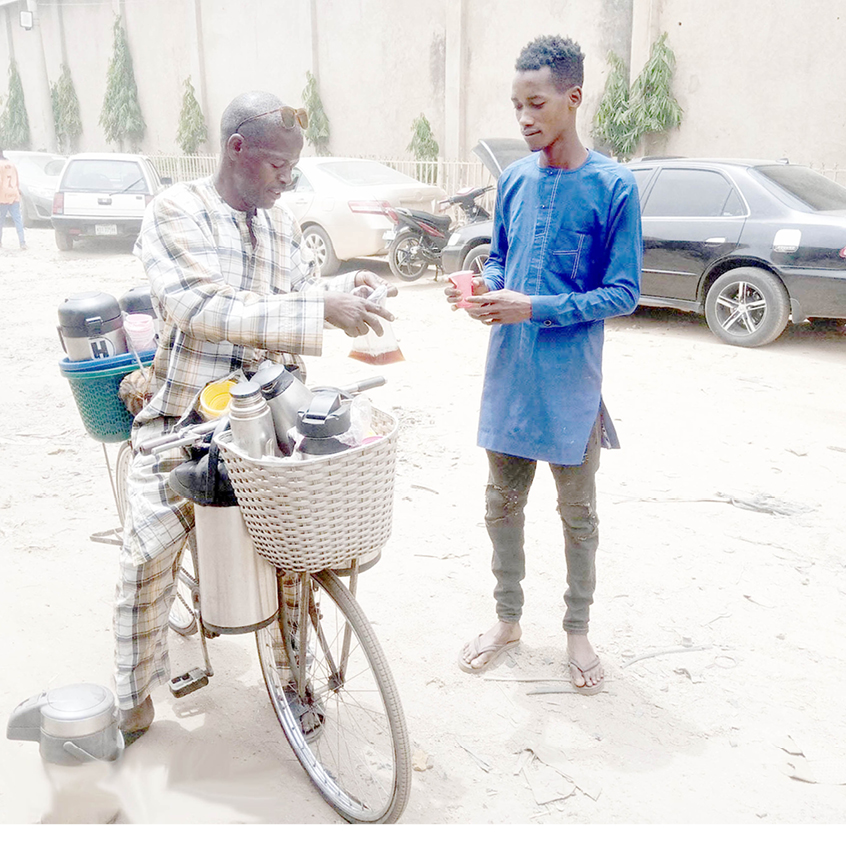Among the residents of Kano city are tea vendors, who earn their daily bread from selling tea on their bicycles. In this Daily Trust Saturday feature, the vendors share their experiences and challenges in the business.
Zayyanu Yusuf is a tea seller who operates on a bicycle at Kofar Ruwa Market using disposable cups – an innovation alien to the people and the tea business in Kano city.
Yusuf had tried his hands on many businesses in Maiduguri but when he came to Kano, he realized that the people in the city liked tea so much and he decided to give the tea business a trial.
An indigene of Gwange in central Maiduguri, Borno State, Yusuf relocated to Kano at the height of the Boko Haram crisis and instead of going to a refugee camp, he decided to start selling tea to earn a living.
“Time has come when people are no longer interested in taking tea in rubber or ceramic cups, they are more comfortable with disposable cups,” Yusuf said.
- 10th N/Assembly: We’re committed to work for better Nigeria – Yari
- NIGERIA DAILY: How People Abuse Children Physically
From the medical point of view, the Chairman Nigerian Medical Association (NMA) Kano State chapter, Dr Abdullahi Kabir Suleiman, said hot water could be served in some disposable cups.
“It depends on the type of disposable cups he is using; non-degraded cups can take hot water. There are paper and plastic disposable cups that can resist hot water. There is also a polystyrene cup which is the better insulator that can take both hot and cold water without any health implication,” the NMA chair said.
A father of six, Yusuf said he found the tea business to be a good venture as apart from taking care of his family needs, he also assists others in many ways from the proceeds of the business.
Though he moves around with flasks of tea on his bicycle, his movement is restricted to the Kofar Ruwa market as according to him, shopkeepers, mechanics and people who frequent the market would not let him go out of the marketplace.

“I tried to expand my area of coverage but my customers did not allow that because they were not ready to miss my tea even for a day,” he said.
The market is popular for trading in building materials, automobile spare parts and has garages for mechanics and artisans. Thousands of customers from within and outside the state patronize the market daily.
Yusuf is always moving from one end of the market to another on his bicycle selling tea, and does not consider that as any challenge because he found the business fulfilling.
Dr Musa Haladu Darma of the Physical and Health Education Department, Bayero University Kano, said while Yusuf could get the benefit of exercise as a result of his daily routine, his movement on the bicycle could not be considered as exercising because of his mind-set.
He said, “Exercise has to be continuous and repetitive and the two are missing in his movement. He has to make stopovers to serve customers the tea and the distance he covers every day is dissimilar.”
The 52-year-old tea-seller operates both in the morning and afternoon in the market. The morning hours start as early as 6am and ends at 11am while the evening shift is from 2 to 4pm daily. The two shifts have separate productions as the quantity of tea he typically produces in the morning usually finishes before 11am. “My customers are always taking fresh tea, I don’t serve leftovers in my business,” he said.
He said people come from far and near within the city to buy from him, adding that, “When preparing the tea, I make sure only the best ingredients are included. I always go for the best to ensure I retain my customers and continue to serve them well.”
Sugar is the major challenge of the tea business at the moment, he said, explaining that he uses “three mudus (kilos) of sugar every day in my tea which equals to N6,600 now and when the amount is multiplied by the number of days in a month and twelve months in a year that sums up N2,376,000 worth of sugar in a year. This alone is enough to show that this business is a big investment.
“Now that sugar is costly, the cup of tea I used to sell for N100 has been reviewed upward to N150, that of N50 is now N100 and I have small disposable cups which I use to serve children who can pay only N50 for the tea to give them the opportunity of having a wonderful tea experience,” Yusuf said, adding that he doesn’t record his daily transactions, but estimated that every day he earns between N4,000 to N5,000 as proceeds from the tea trade.
He explained that whoever is trustworthy in tea trading would be successful in the business, adding that being trustworthy in the business means putting the right ingredients, at the right time, in appropriate quantity and making sure that all the tea apparatus are always clean and tidy.
Though Yusuf sells primary types of tea such as black tea, green tea, white tea, oolong tea, herbal tea and hibiscus tea, the latter is the most popular and most sought after by his customers at the market, he said.
Mubarak Sani is one of Yusuf’s customers. He said Yusuf is exceptional among tea-sellers in the market because his tea has the right ingredients and good taste.
Sani said, “Ramadan (fasting month) just left us, we need to have this kind of tea to keep the Ramadan experience alive. Ginger tea is what I prefer most because it has medicinal value.”
Another customer, Rabi’u Dalha Umar, who buys both black tea and hibiscus tea, said he enjoys Yusuf’s tea because it is one of the best in the market. “I urge him to hold on to his business with all seriousness,” he said.
Saifullahi Murtala Abubakar, a businessman at the market and another customer, said he stored Yusuf’s phone number to ensure that he could always reach him via the phone to serve him his favourite tea, hibiscus and herbs.
Yusuf’s dream in relation to the tea business is not to have a permanent place for selling the tea but to have a good motorcycle and later a car for the mobile tea trading. However, his ultimate ambition is to make enough money to be able to pay for pilgrimage in the Kingdom of Saudi Arabia.

 Join Daily Trust WhatsApp Community For Quick Access To News and Happenings Around You.
Join Daily Trust WhatsApp Community For Quick Access To News and Happenings Around You.


